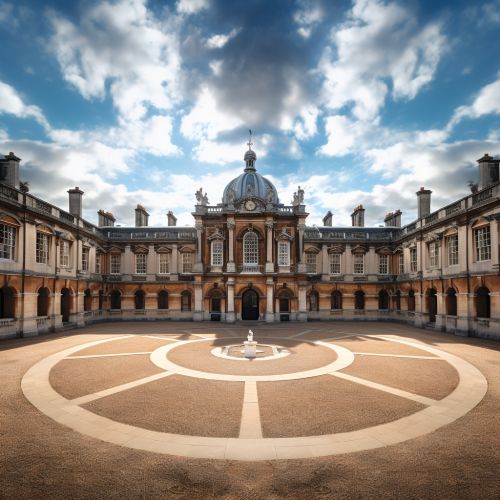Trinity College, Cambridge
History
Trinity College, Cambridge, is one of the oldest and most prestigious colleges within the University of Cambridge. It was founded by Henry VIII in 1546, through the amalgamation of two existing colleges: King's Hall and Michaelhouse, and seven hostels. The college has been home to many notable alumni, including six British prime ministers, several members of the British royal family, and 34 Nobel Prize laureates.


The college's foundation by Henry VIII was a part of his wider plans for the reformation of the Church in England. The King's Hall, founded by Edward II in 1317, and Michaelhouse, founded by Hervey de Stanton in 1324, were both dissolved and their assets transferred to the new college. The seven hostels that were also incorporated into Trinity included Physwick (formerly part of Gonville and Caius College), Gregory's, Ovyng's, Catherine's, Garratt's, Margaret's, and Tyler's.
Buildings and Grounds
The college site covers approximately 40 acres, including several notable buildings and features. The Great Court, believed to be the largest enclosed court in Europe, is one of the college's most iconic features. The court is surrounded by the college chapel, the dining hall, the Master's Lodge, and several student accommodation buildings.
The Trinity College Chapel, a masterpiece of English Gothic architecture, was constructed over a period of over 50 years, from 1554 to 1608. The chapel is known for its intricate fan vaulting, stained glass windows, and the statue of Henry VIII standing above the clock, holding a table leg instead of the original sword.
The Wren Library, named after its designer, Sir Christopher Wren, is another architectural highlight of the college. Completed in 1695, the library houses thousands of books and manuscripts, including works by Isaac Newton and A. A. Milne.
Academic Life
Trinity College has a strong academic tradition, with a broad range of courses offered across the arts and sciences. The college has a particularly strong reputation in the fields of Mathematics, Physics, and Computer Science, with many of its students achieving high rankings in the university-wide examinations.
The college's teaching is divided into two main areas: supervisions, which are small group teaching sessions led by a member of the college's academic staff, and lectures, which are delivered by university faculty members. In addition to these, students also have access to the college's extensive library resources for independent study.
Student Life
Student life at Trinity College is rich and diverse, with a wide range of clubs, societies, and events. The college's May Ball, a lavish event held annually in the summer, is one of the highlights of the Cambridge social calendar. The Trinity College Boat Club, the college's rowing team, is one of the top university rowing clubs in the country.
The college also has a strong tradition of music, with the Trinity College Choir gaining international recognition for its performances and recordings. The college's drama society, the ADC Theatre, is the oldest university playhouse in the country.
Notable Alumni
Trinity College has a long list of notable alumni, including many who have made significant contributions to their fields. These include:
- Isaac Newton, who developed the theory of gravity and made significant contributions to the field of mathematics. - Lord Byron, the Romantic poet and politician. - Ernest Rutherford, who is often referred to as the father of nuclear physics. - J. J. Thomson, who discovered the electron. - Bertrand Russell, the philosopher, logician, and Nobel laureate. - Ludwig Wittgenstein, the philosopher known for his work on the philosophy of mind and language.
See Also
- University of Cambridge - List of Nobel laureates by university affiliation - Colleges of the University of Cambridge
